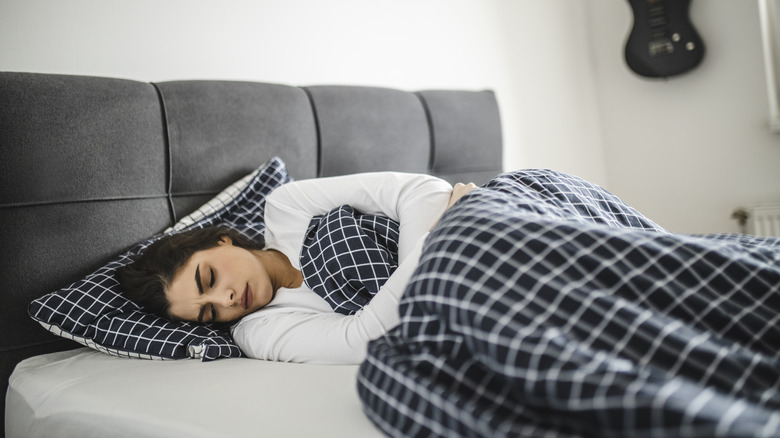This Is What Happens To Your Gut When You Don't Get Enough Sleep
When it comes to the topic of gut health and sleep, we often think about things like the best sleep position if you have an upset stomach. While there's a connection between digestive issues like bloating, diarrhea, gas, irritable bowel syndrome (IBS), and inflammatory bowel disease (IBD), and sleep, there's also the reverse — where poor quality sleep impacts your gut.
For starters, a lack of sleep leads to higher levels of the stress hormone cortisol in your body which can negatively affect your gut health. As explained by functional lifestyle medicine physician with Henry Ford Health, Dr. Ryan Barish, "Increased stress can cause intestinal permeability issues — or something known as leaky gut — where food and toxins are able to pass through the intestine and into the bloodstream. This can lead to a host of issues including bloating, inflammation, stomach pains, food sensitivities, and changes to the gut microbiome."
Going to bed later in the night and following irregular sleep patterns may also throw your hunger and satiation hormones out of whack. This can lead to you making poor dietary choices, like snacking late at night, relying on takeout, and indulging in high-sugar or highly processed foods. All of this can affect your gut health too. A healthy gut is very much about the food you consume. There is also some science linking irregular sleep patterns to changes in your gut microbiome.
You might have more disadvantageous gut microbiome if you don't sleep enough
What science is learning about gut microbiome and how it affects your health is still relatively new but what we do know is that gut health is related to your immune system and diseases like IBD, heart disease, diabetes, and cancer, along with your mental health. It also affects how well you sleep. As we've established, the relationship between sleep and gut health is bidirectional.
A 2023 study published in The European Journal of Nutrition found that social jetlag (having different sleeping schedules) was linked with a higher prevalence of disadvantageous gut microbiome. Senior author of the research, Dr. Wendy Hall shared (via EurekAlert), "We know that major disruptions in sleep, such as shift work, can have a profound impact on your health. This is the first study to show that even small differences in sleep timings across the week seem to be linked to differences in gut bacterial species."
The study looked at the gut microbiome of 934 participants in two groups– one that was thought to have social jetlag because of irregular sleep patterns and one that didn't. According to researchers, the social jetlag group had more significant concentrations of three microbiome species that are considered unfavorable to health (via Global News). The study also hypothesized that poor diet quality and higher consumption of sugary drinks could be contributing to this change. However, gut microbiome associations are still in their infancy and there could be more factors other than sleep contributing toward this change.
How to protect your gut health by prioritizing sleep
When work and other responsibilities pile up, sleep seems like the easiest thing to sacrifice to complete all you need during the day. But take a step back and consider the implications. An average adult is required to get anywhere between 7-9 hours of sleep and sleep experts have long been touting the benefits of maintaining a consistent sleep schedule for better energy levels, brain health, and now apparently your gut too.
One simple thing you can try doing to improve your gut health is to maintain a consistent sleep pattern — go to bed at roughly the same time every night, make sure you're getting your recommended hours of zzzs, and wake up at approximately the same time. This might prove difficult for shift workers (who were a particular concern in the 2023 study), but try as much as possible to look at your sleep hygiene and eating habits. Is your room dark enough to induce sleep, even if it's daytime? Are you consuming food closer to bedtime because of your lifestyle? Are you having trouble maintaining a healthy and nutritious diet? All of these questions need to be addressed. If you can't do away with shift work, try and maintain an overall healthy lifestyle.
This looks the same for everyone: exercise regularly, eat a diet rich in vegetables, fruits, healthy fats, and lean meats, hydrate well, manage your stress, and make sure you're sleeping enough. Your gut will thank you.



